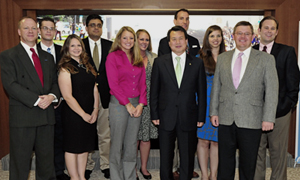Many UT Dallas students are treating the world as their classroom this summer, making study abroad a part of their college education.
Several dozen will take along the ultimate tour guide – an instructor with expert knowledge of the destination’s culture, geography and history.
In instructor-led courses, a faculty member organizes a course for academic credit and escorts an entire class abroad for experiential learning.
“Over the past 10 years, we’ve seen a growth in this type of travel, which corresponds to the internationalization of higher education,” said Office of International Education (OIE) Director Rodolfo Hernandez Guerrero.

A group of UT Dallas students met with the mayor of Seoul last summer in a visit to South Korea.
Of the 1,133 UT Dallas students who participated in international education between fall 2005 and summer 2010, 49 percent chose an instructor-led option.
Robert Haynes, a graduate student in the School of Economic, Political and Policy Sciences, traveled in summer 2010 with Dr. Jeremy Hall’s Policy Management class to Seoul to see firsthand how local government works in Asia. Hall guided students by integrating the master’s-level public affairs coursework with the practical policy aspects of the Seoul Metropolitan Government. Students finished the course by writing an analytical paper incorporating their experiences from Seoul.
University Resources Aid
Students Going Abroad
Students and faculty have help when it comes to planning – and paying for – a safe, enjoyable and legitimate academic experience.
The OIE and the Office of the Provost offer guidance for students preparing to study abroad. They also help faculty with the academic and logistical preparations necessary to conduct a course outside the U.S.
A $3 per semester student fee supports the University’s International Education Fund Scholarship (IEFS), which is administered by the OIE. Assistance is awarded by competitive proposal process, and is based on factors including availability of funds, number of students applying, geographic diversity and proposal quality.
During the fall 2010 semester, 58 students received travel assistance from the IEFS. The fund supports students pursuing credits abroad. The deadline to submit IEFS proposals for 2011 summer travel abroad is March 29. Other scholarships also are available.
The Office of International Education supports seven types of international travel:
- Exchange programs.
- Faculty-led (customized programs).
- Internships.
- Independent study.
- Non-credit programs.
- Research.
- Study abroad.
For more information, visit the OIE website.
“Aside from the expected cultural worth, we learned by direct interaction from professors and governmental officials with the Seoul Metropolitan Government,” Haynes said. “The candid look into their decision-making process and program implementation strategy was more than most Seoulites experience in a lifetime.”
Over spring break, the School of Management conducted two faculty-led study trips. One group of 28 traveled to Uruguay, while another group of 24 traveled to Poland and Germany. Instructors are charged with ensuring that all participating students realize their potential as global leaders through exposure to international academics, research and cultural engagement. The students in Uruguay were hosted by companies such as Tata Consulting, Uruguay XXI, the law offices of Pittaluga Abogados, Mercosur and the Montevideo Stock Exchange. The group also traveled to the Universidad de Montevideo, where students attended a seminar and interacted with UM students.
Students on the Poland and Germany trip were hosted by IBM, Lech and BMW, who provided extensive tours into their factories and assembly lines. Students participated in a lecture at Poznan University of Economics.
This summer, instructor-led programs will take students to Argentina, Italy and South Korea.
Venice (LIT 3381), taught by Literature Professor Timothy Redman, is scheduled for June 5 – July 3. This marks the second summer Redman has taken students to Italy – the first was in 2009 with an Italian Renaissance course. This time around, 10-15 students will live and study in Schloss Brunnenburg, a castle near Merano, Italy. The castle, built circa 1250, is also home to the late poet Ezra Pound’s daughter Mary and her family, who invite the students to join them for tea every afternoon.
Redman has a personal tie to Italy: He is fluent in Italian, having spent many years living in Rome, and 35 years ago he traveled to the Brunnenburg castle for the first time. Redman says, “I felt, for the 35th anniversary of that first visit, I had to put something special together — to go back to the castle.”
The 2011 course, which is now full, is for undergraduates. Students select a project and balance 45 hours of coursework with three long weekends to travel where they wish. The self-styled excursions provide an opportunity to see more of Italy, and absorb linguistic and cultural lessons that cannot be found in a book.
Redman says the study abroad experience is unlike any other.
“Travel is broadening because you see that what you take for granted isn’t universally true,” Redman said. “The experience can shock you into awareness, allowing you to learn from observing.”